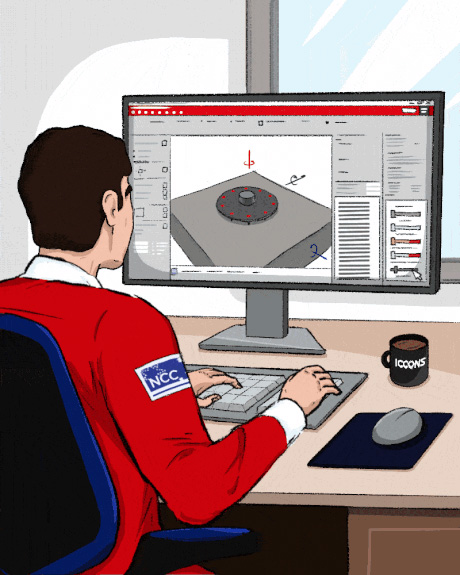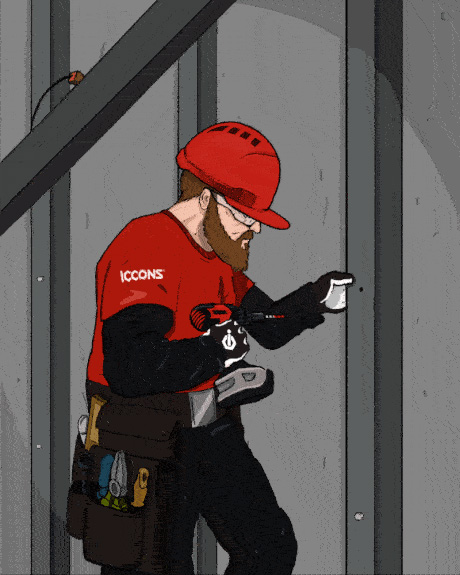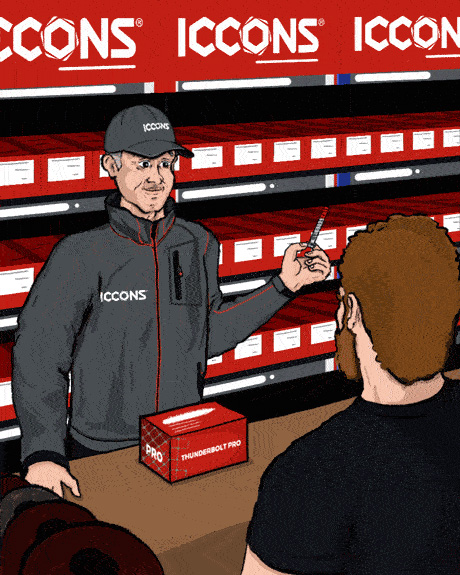What is an Adhesive or Chemical Anchor?
A chemical anchor, otherwise known as an adhesive anchor or mortar anchor is a combination of products which are designed to ‘hold down’ threaded rod or rebar into concrete or bricked substrates, allowing for a post-installed solution to the connection.
Chemical anchor connections always consist of at least 2 products, the chemical anchor itself and an anchor element such as a threaded rod, rebar or internally threaded rod. ICCONS offer the chisel point stud threaded rods which are supplied at various lengths, it also has a mark outlining the recommended embedment depths which allow for a simpler installation on site. Chemical anchors offer a solution where the connection can be installed once the slab or wall has already been built and a cast-in solution has not been incorporated in the design.
Chemical anchors largely utilise bonding to sustain the loads on the connection. If it is used in a hammer drilled hole, it also relies on the ‘micro-keying’ effect which is obtained through the roughened hole in the concrete when using a hammer drill bit. The bonding and micro-keying effect makes chemical anchors the most versatile post-installed anchoring product line. It allows chemical anchors to be used in shallow embedment, deep embedment, solid substrates and hollow substrates.
The ICCONS chemical anchoring range as part of our Anchor Armour® program has products which are suited for general purpose fixings on residential and temporary works ranging to ultimate connection requirements for structural, infrastructure and mega-project requirements. All of our chemical anchors are European Technical Assessed (ETA) and are directly compliant with
the requirements of AS5216:2021. Our high-end chemical anchors can be designed to sustain the following design requirements:
Types of Adhesive or Chemical Anchors
Chemical anchors have traditionally been categorised by their chemical composition. From the highest performing to the most cost effective, the general category flow is shown below:
However, due to technological advances and newer products in the market, the performances of each individual product may be higher that the category and the performance flow should only be used as a guide.
ICCONS has a high-performing product in each of the chemical category which competes with the best in the market for performance and approvals. All our chemical anchors have an ETA and is directly
compatible with AS5216:2021. We are aware that it is common for chemical anchors to be mistakenly used on site when the packaging is similar colours. All ICCONS Chemical anchors have been incorporated in our ChemSelect® program which allocates a colour based off the specific product. For example, our ICCONS BIS-Polypro is colour coded blue and BIS-PE Gen 3 colour coded white to avoid any mistakes on site.
The chemical anchor rod is also an important aspect to the selection of the chemical anchor connection. The ICCONS CPS threaded rods are our general-purpose rods which can be used for most medium and heavy-duty applications including structural connections. It is available in zinc plated, HDG coated or A4 stainless steel materials. For applications where deep embedment design is used or severe shear loads are applied on the anchor, our high-tensile CFCHT should be used.
What are Adhesive or Chemical Anchors used for?
Chemical anchors are the most versatile post-installed anchoring solution. They can be used on general purpose fixings such as bollards and awnings to heavy duty structural connections in high-rise buildings, bridges and tunnels. Chemical anchors are the only approved solution with the Australian standards on extreme post-installed connections which require
100-year design life.
Chemical anchors utilise bonding and ‘micro-keying’ to achieve its performance. Therefore, complex connections can be adjusted to the suitable embedment depth and a design capacity can be determined
using AS5216 to suit the requirements.
Further to the general anchor connections, chemical anchors are well-suited to connections close to a concrete edge since there are no expansion forces exerted to achieve the performance on the connection. It is also a great option for hollow substrate applications such as hollow blockwork and hollow brick.
Common applications for Adhesive or Chemical Anchors
- Structural baseplate connections.
- Façade connections.
- Hold down heavy machinery.
- Bollards.
- Post-installed rebar (starter bars).
- Shear connectors.
- Crash barriers.
- Street signs.
- Traffic lights.
- Connections to bricks.
- Connections to blockwork.
- Connections to sandstone.
- Handrails.
- Steel stairs.
- Road stitching.
- Column and beam to slab connections.
- Punching shear reinforcement.
- Awnings.
- Asphalt fixings.
How to use Adhesive or Chemical Anchors
Chemical anchors will require cleaning of the drilled hole during the installation process. It is important to follow the instructions set out by the manufacturer of the product. For all ICCONS chemical anchors, the instructions are shown on the chemical cartridge, technical datasheet and ETA documents. All ICCONS chemical anchor cartridges will have a QR code which will allow instant access to the product’s technical datasheet online.
Chemical anchors may have slight variations to the installation process, it is important to check the installation process of the exact chemical being installed on site prior to beginning. The TDS will provide useful information such as:
- Drilled hole diameter.
- Cleaning accessories required.
- Process of cleaning.
- Injection techniques.
Some chemical anchors such as our BIS-PE Gen 3 and BIS-HY Gen 2 will allow the use of installation in conjunction with a Heller hollow drill bit. This allows for the cleaning process to be sped up and allows some steps to be voided in the cleaning process.
Suitable base materials
Chemical anchors are approved for use in the widest range of substrates when compared to mechanical anchors. Since the product uses bonding and keying to achieve the design capacities, it can be used in the following materials. For hollow applications, a chemical sieve is required.
- Concrete
- Fibre reinforced shotcrete
- Hollow and core filled block work.
- Aerated Concrete (eg. Hebel).
- Solid and hollow bricks.
- Natural Stone (Sandstone).
- Asphalt.
ICCONS is dedicated to providing a holistic design solution for your project. Further to our European Technical Assessments in masonry, we have further tested in Australian masonry to ensure that the loads can directly be tangible for your project. Please email
[email protected] to obtain further information on these reports.
Who should use Adhesive or Chemical Anchors
Chemical anchors are a versatile product and therefore anyone in the construction industry that is looking to fix into concrete, masonry and natural stone may be using chemical anchor for their project. Specific trades which commonly use these products are:
- Structural steel fabricators and installers.
- Façade structure installers.
- Civil contractors for roads, bridges and tunnels.
- Balustrades and handrail contractors.
- General contractors.
- Crash barrier installers.
- Formworkers (starter bar applications).
- Shotcreters
- Heavy electrical contractors.
- HVAC contractors.
- Rail Infrastructure.
- Remedial works contractors.


























